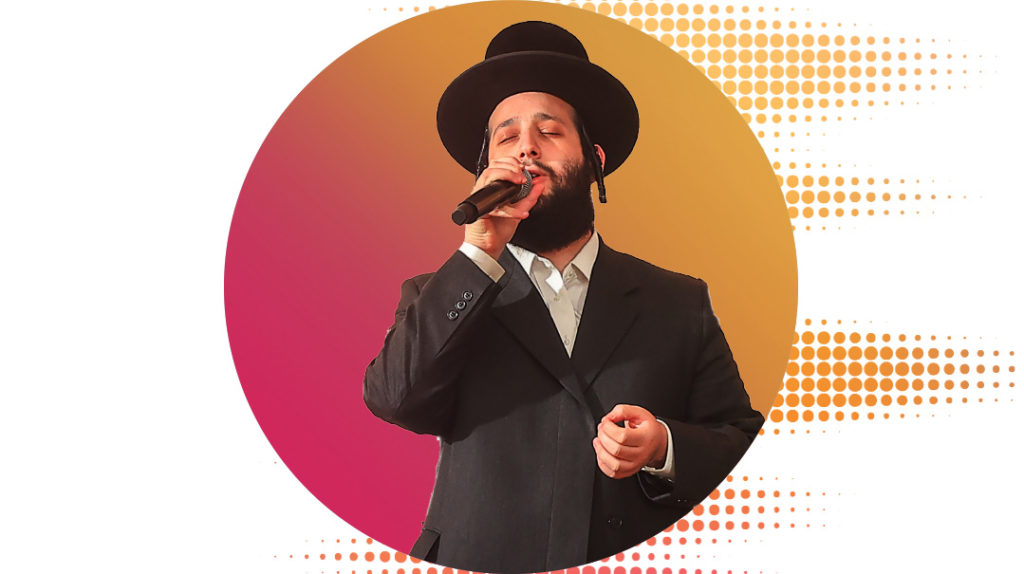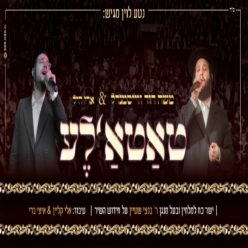He’s using the Sefirah-mandated break from weddings to work on his own collection album
A popular singer at weddings in Bnei Brak, Jerusalem, and as far afield as bookings take him, MOSHE DOVID WEISSMANDL has a heartwarming style that has won many fans for his singles together with Ari Hill, Dudi Kalish, composer Bentzi Stein (“Abba”), and the Neshama Choir. He’s using the Sefirah-mandated break from weddings to work on his own collection album.
THE BEST NIGGUN FOR STARTING A SEFIRAH KUMZITZ
I generally start with an old classic, Shlomo Carlebach’s “Lemaan Achai.” It fits perfectly with the atmosphere created when a group sits down to sing and be inspired together. The harmonies are simple — almost anyone can manage them — yet are very beautiful.
A SONG I NEVER GET BORED OF
There’s “Thank You Hashem,” which I can sing all day, no matter what's going on. And there’s a classic hakafah niggun, “Sisu vesimchu besimchas haTorah, ki hi lanu oz ve’orah,” which I find very refreshing and always creates some uplift and a happy mood. I’ll sing that at any hachnasas sefer Torah or siyum.
THE MOST REQUESTED CHUPPAH SONG
The all-time most requested song is Moshe Goldman’s “Pnei Le’elbon” tune for “Mi Bon Siach.” This past season here in Eretz Yisrael, once the chassan and kallah are both under the chuppah, I was often asked to sing “Shaarei Shamayim P’sach,” a new single composed by Reb Pinchos Bichler and released by Zanvil Weinberger.
WORDS THAT MOVE ME EVERY TIME
“Veyeida kol pa’ul ki Atah pe’alto... (and every creation will know that You are the One setting him in motion).” I wish I could write my own beautiful niggun to those mind-blowing words.
THE HOTTEST SECOND-DANCE SONG THIS SEASON
The mussar personality and mashpia Rav Don Segal, who is very musical, composed a song way back called “Tattele, Kum Shoin Aheim.” Ari Hill and I recently released a new production of this song, reworked by composer Bentzi Stein, as a single. Baruch Hashem that has been an amazing second-dance hit.
MY ALL-TIME FAVORITE JEWISH MUSIC ALBUM
I would say, Al Hehorim by Isaac Honig. All the songs are very special, but for me the highlight is the Yamim Noraim song, “Heyei Im Pifiyos.” I was just a kid when the album came out, but since then, that song is always sung by the crowd along with the chazzan in our Skverer shtibel in Bnei Brak where I daven, and I find it very moving every time.
MY FIRST STUDIO EXPERIENCE
I was still a bochur and wasn’t doing any professional singing, when a friend asked me a favor at his wedding: The badchan, Dudi Kalish, wanted someone to back him up with harmonies at the mitzvah tantz. That Motzaei Shabbos, I got a call from Dudi, asking me to be part of the choir on a project he was working on, and I soon found myself in the studio.
MY FAVORITE YIDDISH SONG
MBD’s “Modim,” with lyrics by Lipa. The song is like a peirush on what a Yid feels for HaKadosh Baruch Hu — in short, it’s a relationship of endless thanks.
A SONG THAT’S A GREAT CONNECTOR FOR ALL KINDS OF JEWS
I’ve found that Reb Ben Zion Shenker’s “Hatov Hatov Hatov” really strikes a chord with everyone. It’s an old song, but when you sing it, you can sense how everybody in the crowd feels filled with its message of gratitude and optimism, even in more “modern” weddings and events. Whoever you are, the universal truth of how much good we have, and how much Hashem blesses us with every moment of our lives, resonates in that song, and it’s something so positive to grab hold of. No one group has a monopoly on thanking Hashem.
A SONG THAT GIVES ME CHIZUK IN DIFFICULT SITUATIONS
“Bechol Tzaar Vetzaar,” by Motty Ilowitz. It really emphasises how Hashem is with us in our suffering and never leaves us alone. I was once singing for a very sick patient in the hospital. I was told that although she was not conscious, she could hear and understand. When we sang this song, we could see that she was crying — tears were streaming down her face. We left her room and went on, and by the time we reached the end of our rounds and left the hospital, I got a message that this patient was niftar. It was as if this was a last message of comfort for her.
MY FAVORITE LINE OF HEBREW LYRICS
“Afilu she’asinu mashehu ra, Hu mochel vesolai’ach (Even if we’ve done something terrible, He pardons and forgives),” from Ishay Ribo’s “Lashuv Habaytah.”
A COMPOSER I CONNECT WITH
Pinky Weber is one of my favorites. I enjoy his taste in music, and his content is always so interesting. He’ll never bring out boring material, and no matter how long he’s at it, he somehow manages to be constantly innovative.
AN OPPORTUNITY I LOOK BACK ON
I knew about three chords of guitar when a friend asked me to come along and play and sing in the hospital. I said I barely knew how to play, but he advised me to jump in the deep end and learn that way. So it was — we ended up going pretty often, I played a lot, and improved a lot, and I think that visiting people to cheer them up opened up musical pathways for me.
A SONG THAT TAKES ME BACK TO MY CHILDHOOD
The old Vizhnitz niggun “Gut Shabbos, Gut Shabbos, Gut Shabbos...” brings back the sounds and delicious aromas of Erev Shabbos in my childhood home, because it played every Friday afternoon on the loudspeakers next to our house.
AN ALBUM I’D TAKE ON A LONG ROAD TRIP
Varemkeit, released by Shragee Gestetner a”h. It’s a collection of beautiful Yossi Green songs that I never get tired of listening to. Shragee sang with so much heart. I can listen to it on and on.
(Originally featured in Mishpacha, Issue 908)



